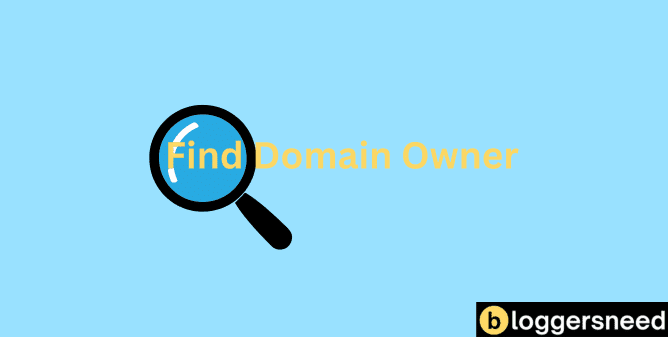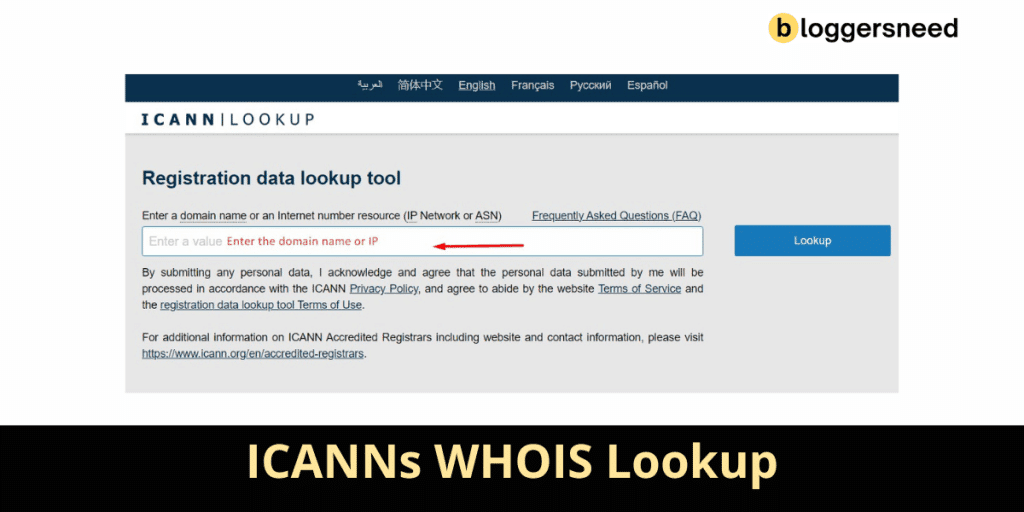
To find out who owns a domain name, you can use a WHOIS lookup tool. These tools are easy to find on websites and APIs. They give information about the person’s name, nameservers, and when the domain was registered and will expire.
You can also go to the website directly to find contact information in the footer or legal sections.
If the ownership info is private, you can reach out to the registrar of the domain for help.
Social media sites and domain brokers can also help you find domain owners.
Table of Contents
What Is a Domain Name?
When you access a website, you use a domain name. This is a name made up of letters and numbers that connects to the website’s special IP address. It helps you remember and find websites easily. The domain name acts as text for the website’s actual IP address. This allows your browser to find the correct IP address through the Domain Name System (DNS).
To show how domain names work, think of them like a physical address. A physical address helps you find a specific house. A domain name does the same thing online. It guides your browser to the right website. Each domain name is different. This way, users can easily find the correct website without any mix-up.
A domain name usually has a specific format. It includes a top-level domain (TLD), a second-level domain (2LD), and sometimes a third-level domain (3LD). For example, in ‘google.com’, ‘.com’ is the TLD, ‘google’ is the 2LD, and there is no 3LD here. This simple structure helps to resolve domain names better.
It is important to know that the longest a domain name can be is 63 characters, not counting its extension. The shortest can be just one character. For instance, the domain ‘example.com’ has two parts: the TLD ‘.com’ and the second level domain ‘example’.
Who Is the Domain Owner?
To find out who owns a domain name, you usually need to check the domain’s registrar or web hosting service. The owner’s contact details are saved in the domain name’s WHOIS record. This record is a public database that you can reach with different tools and websites.
To get this information, you can use tools like GoDaddy WHOIS, Shopify’s WHOIS or ICANN Lookup database tool. You can find important details about a website, such as when it was created and when it will expire. You can also see the contact details of the registrar. This database is free and open to everyone, so it is easy for anyone to use.
What Are the Ways to Find Domain Ownership?
Now that you want to buy a domain name, you should check who owns it right now.
There are several ways you can do this. You can try a WHOIS lookup. You can also visit the website directly. Another option is to contact the registrar of the domain. You can use social media, or you could hire a broker to help you.
These techniques will help you find out who owns the domain. You might be able to talk about buying it.
1. Performing WHOIS Lookup
To find out who owns a domain name, you can use the WHOIS service. This will give you helpful information about the domain. You will see details like contact information and the dates when it was registered.
WHOIS is like a public directory for website registrations. It provides important information, such as the registrant’s name, name servers, when it was registered and when it ends, and contact details. This information is saved in different ways. One way gives a lot of details, while the other needs additional checks to get all the information.
You can do a WHOIS lookup in many ways. There are several online tools and command line options that help you with this. They give you a good overview of who owns the domain.
To find domain owner, visit https://lookup.icann.org/en/lookup and enter the domain name or IP address in the search bar and click Lookup button.

2. Visiting the Website Directly
By visiting a website directly, you can find important details about who owns the site. Look for contact info on the website. This can be on an ‘About Us’ page, a ‘Contact Us’ form, or a mailing address. A phone number or email address is usually found in the footer or legal section.
Additionally, look for links to social media profiles where you can try to reach out. For example, if the owner of the site has a business, they might have a LinkedIn page or another professional online account with contact details.
However, some sites might use privacy services. This makes it harder to find contact information directly. In these cases, try other methods. You can use WHOIS lookup tools to find out more about the owner.
3. Contacting the Domain Registrar
To find other ways to get information when the domain owner’s contact details are private or hard to find, you can reach out to the domain registrar. This can help you when you want to have control over a domain.
Once you find the registrar with tools like WHOIS, you can contact them directly for help. Registrars like GoDaddy usually have special support teams or abuse teams that can help with the issue.
If you think you own the domain but someone else is managing it, you can show proof of ownership. This proof can include any contracts that detail your rights to the domain. If there is any doubt, the registrar might ask for more proof to help with the transfer.
Keep in mind that talking to the registrar does not always promise a good result. It is still an important step in settling crowd-related issues and getting your wanted domain name.
4. Using Social Media
To check who owns a domain name using social media, begin by using popular sites like Facebook, LinkedIn, Twitter, Instagram, and TikTok. Make sure to set up your social media accounts before you register your domain name. This helps keep your brand strong and stops others from taking the domain name you want.
By looking for domain owners on social media, you can reach out to more people and find important information. This method gives you personal and simple results, which can be more real and trustworthy than old search engines. For example, you might discover an owner’s contact details on their social profiles.
This method helps you keep your brand identity the same on different platforms. This way, you can stop others from taking your desired domain name on the same day. Doing this can help prevent mix-ups and problems with your brand’s image.
5. Hiring a Domain Broker
When you check who owns a domain, using social media platforms can be helpful.
However, for tough or important situations, using the help of a broker is a good idea.
These professionals focus on helping buyers and sellers make deals. They know a lot about making tough talks easier.
They help find the right owners. They keep things private if needed. They also make sure the transactions go smoothly.
If you want a special domain or have a well-known business, a broker keeps your identity safe while he negotiates for you.
In high-end transactions, the broker’s experience in managing difficult deals is important.
They also give advice on making smart budgets and staying away from scams.
What Drives People to Look for Domain Owners?
You may be asking why people look for domain owners.
They often want to buy the website or look into business chances with the current owner.
When looking for a domain owner, it is usually for distinct reasons. You might want to acquire the domain or tackle some technical challenges such as addressing security issues or resolving a DNS misconfiguration.
People may also want to check if a site is real or get information for research.
Additionally, you may want to look into ownership to report possible trademark infringement or check for cases of spamming.
Is Buying a Domain the Main Reason for Looking for Ownership?
Yes, buying a website name is often the main reason for looking into ownership.
Most people look for domain owners to get a certain web address. They usually want this for their business or personal websites. They want new digital identities.
This could lead to good business deals or even buying the website if it’s available.
Is It Legal to Search for Domain Ownership?
It is legal to look for who owns a website if it is done in a specific way and for a certain reason.
Legit searches are usually allowed, especially through public databases like WHOIS. Law enforcement often uses this data in their investigations.
However, you can ask for nonpublic registration data through the Registration Data Request Service (RDRS) if you need it. This is very helpful for law enforcement, property experts, and other groups that have a real interest.
Too many questions can feel like a breach of privacy laws. It is important to check that the reasons and ways of asking are right and follow the rules.
Is Checking Ownership for Spam a Common Reason?
People look for the legal owner of a domain because of spam and online fraud. These are important reasons to do this.
They usually look for warning signs like several past owners, odd content, or scams that try to trick you using free email services like Gmail or Outlook.
This careful look helps to make sure things are trustworthy when working with a field. This often brings out important details.
How Can You Keep Domain Ownership Private?
To keep ownership of your website private, you can use privacy services from your domain registrar. These services change your contact information to use different info. This hides your data from the public and stops spammers and marketers from getting it from the WHOIS directory.
For example, Namecheap Domains gives free privacy at most domain endings. It hides your contact info and uses a privacy provider like Contact Privacy or WHOISProxy instead.
Using these services can lower unwanted requests and improve safety by protecting against data leaks. However, it’s important to know that your registrar will still have your real contact information.
Moreover, legal problems can happen if the business owner is not listed in the WHOIS directory as the owner. This could make domain security weaker.
In general, it’s important to pick a registrar that values privacy. For example, Cloudflare Registrar gives free WHOIS privacy. It also turns this feature on for all domains by default.
Affiliate Disclosure: Some of the links in this post are affiliate links, which means I may earn a small commission if you make a purchase through those links. This comes at no extra cost to you. Thank you for your support!
